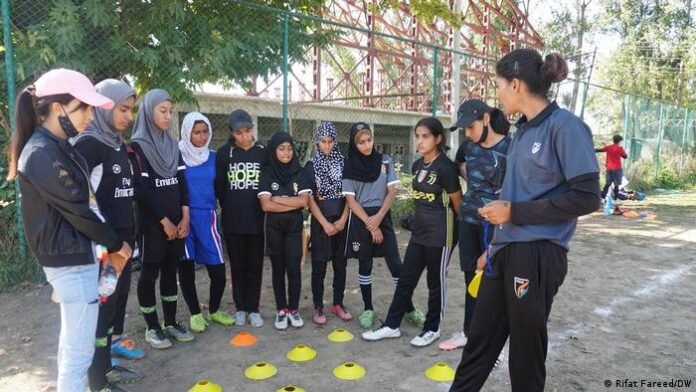In Muslim-majority Kashmir, female athletics is often frowned upon. DW spoke with women who are breaking taboos and teaching girls the value of committing to sports.
It is a sunny afternoon on a football pitch in Indian-administered Kashmir’s largest city, Srinagar. Girls wearing hijabs and uniforms are running laps to warm up for practice.
Nadiya Nighat is their coach, and she says playing football teaches the girls discipline.
“I want to make them tough and punctual. I want to teach them the importance of being on time in sports,” Nighat says, as she calls out two girls for being 20 minutes late.
In conservative Muslim-majority Kashmir, pursuing a career in athletics is a difficult choice for many women to make. Nighat has encountered many obstacles along her way.
At the age of 11, Nighat said she played football with the boys in her town. At times, she was beaten and stigmatized by her family and neighbors for playing a game “not meant for women.”
Now 25, Nighat is Kashmir’s first female football coach, training 30 young female footballers aged 11-20.
“My family did not like the idea of a career in football initially,” Nighat told DW. “They would tell me to do something else.”
Nighat had played on teams and earned accolades in several Indian states before opting to become a football coach. Nighat said she thought about giving up on her dream many times in her career.
“Once, I was playing in a tournament with the boys’ team, and I was spotted after three matches and was told that I would be banned,” she said.
“I was very disheartened. I thought, maybe it’s over for me. I was forced to play with boys because there were no girls,” said Nighat. But her coach encouraged her to keep playing, she added.
Social stigmas for female athletes
Nighat said her family and neighbors took convincing that women could participate in sports.
“Our neighbors would talk about me and tell my mother not to allow me to play with boys. But now, after my work got recognition, they support me,” she said.
However, despite her own success, Nighat is aware playing sports continues to be a tough choice for women in Kashmir.
“I had many friends who would play football, but due to family pressure, they quit. Some girls would come to the field without letting their families know,” she said.
An athletic role model for girls
Nighat has been running a training facility for six years and encourages girls to become involved with athletics.
“I am just trying to help young people and mostly young girls. The local football association is helping me. In Kashmir, I feel it’s important to be a coach because girls find it hard to get training,” she said.
Nighat said that girls travel long distances to take part in training.
“Some girls travel 40 kilometers (25 miles) every day to practice. It motivates me that I am doing something worthwhile. I might be helping them to realize their dream,” she said.
Haniya Muzaffar, 14, takes the bus to Nighat’s football training.
“In my village in central Kashmir, I used to go with my brother to play, but there were no girls. I was practicing alone,” Muzaffar told DW. “I found out about this academy for girls on social media and joined,” she added.
Shaheena, a mother who accompanies her young daughter to Nighat’s football training, spends hours out of her day attending her daughter’s training sessions.
































